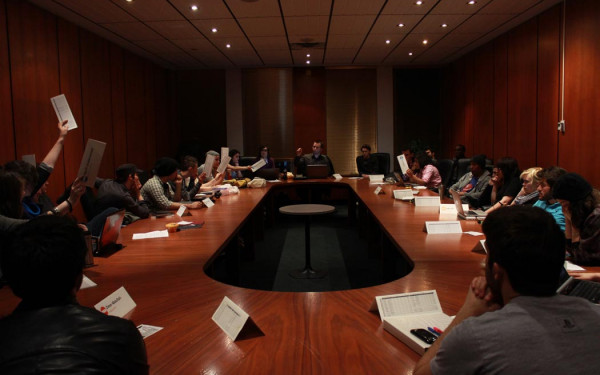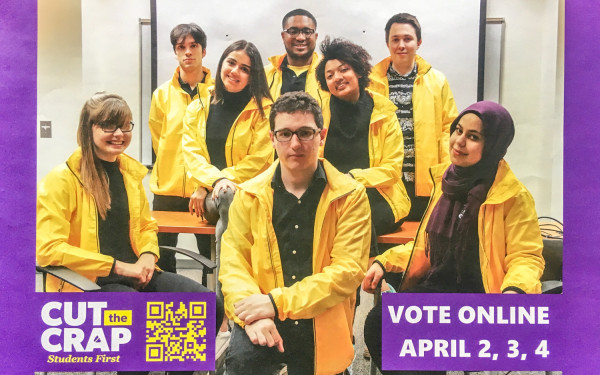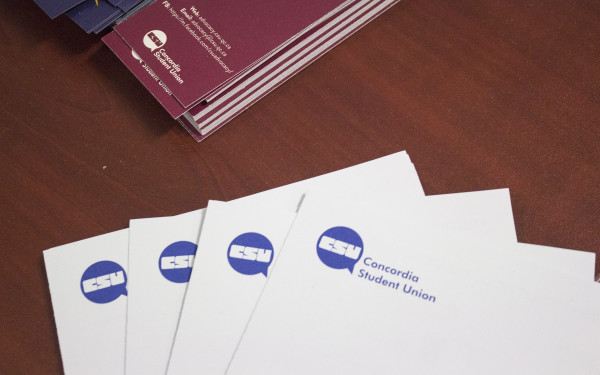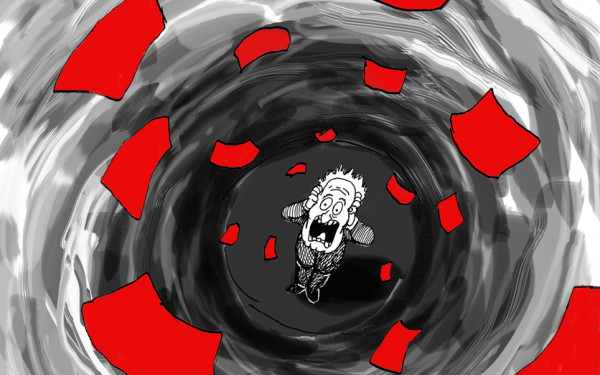CSU Cut the Crap Disqualification Overturned by Judicial Board
Most Candidates Reinstated in Appeal After Judicial Board Discards Additional Information
Concordia Student Union Cut the Crap candidates, who were elected then disqualified in the 2019 general elections, appealed the Chief Electoral Officer’s decision. In Tuesday’s ruling, the Judicial Board announced that all members of the slate, with the exception of Danielle Vandolder-Beaudin, were reinstated.
After Vandolder-Beaudin was caught campaigning during the polling period, the CEO announced in a Facebook post on April 5, that the entire slate had been disqualified. The Judicial Board set a meeting for April 18 to allow the candidates to appeal the decision and asked for additional information to be sent to them.
In the appeal, which General Coordinator candidate Christopher Kalafatidis made public, he wrote they were appealing the CEO’s decision “on the grounds that this decision is manifestly unreasonable. It is abundantly clear that the CEO has misinterpreted the standing regulations, applied inappropriate sanctions, and overstepped his authority.”
_900_600_90.jpg)
The disqualification was based on Vandolder-Beaudin violating campaign regulations stating that “electronic balloting provides opportunities for abuse, intentioned or not, by voters, candidates and campaign workers. Abuse of electronic balloting includes, but is not limited to, the following types of action:
1. Pressuring individuals to vote in the presence of a candidate, campaign worker, or any other individual
2. Bringing the means of electronic voting to a voter”
The appeal claims Vandolder-Beaudin could not pressure the voter because she was not physically present with the voter and was instead communicating them electronically. They added “bringing the means of electronic voting to a voter” is unclear, and thus “[does] not hold up in this case.”
Kalafatidis also said the CEO’s statement claiming there was a “striking difference in the number of votes,” which would show a correlation between the team’s election and campaigning during voting, was a “logical leap on the part of the CEO” that is “unfounded and appears as highly prejudicial,” and it “holds no weight with regards to making a decision on sanctioning, let alone disqualification.”
During the hearing, CEO Florian Prual showed evidence of Vandolder-Beaudin, Kalafatidis, and Academic and Advocacy Coordinator candidate Patrick Quinn messaging voters, telling them how to vote for their slate.
Related- Cut the Crap Slate Disqualified After Being Voted in
- CSU Election Results: Cut the Crap Disqualified, Runners Up Elected
Prior to the hearing, only evidence of Vandolder-Beaudin breaking standing regulations was made public. The CEO and witnesses gathered additional information to present between the time of the disqualification and the hearing. Despite asking for additional information, the Judicial Board chose to ignore all evidence gathered after the disqualification, said the CEO.
When asked to define a gross violation of the standing regulations by the Judicial Board, Prual said it is a breach that is conscious, systematic, and repeated.
Prual said that “now, the people who pushed for online voting violated the rules that they set up,” the candidates were acting in full knowledge they were breaking the rules, and it was done repeatedly throughout the polling period by multiple candidates on the slate.”
_900_600_90.jpg)
“They will vote for everyone in the messages which gives an unfair advantage,” he said. He added he had received more screenshots than he posted, but kept them private out of fear as he said he was being cyberbullied by Cut the Crap followers.
One witness—who cannot be named under a publication ban imposed by Judicial Board—testified saying it was “super disheartening to see the team cheat. It’s like Danielle voted by proxy; the person who voted obviously didn’t know the slate and didn’t have an informed vote.”
They also said they fear this will set a precedent, letting people know “they can cheat and get away with it.”
Finance Coordinator John Hutton had been on the committee in charge of drafting the standing regulations for online voting with Kalafatidis and Quinn. He says “pressure is influencing and that happened. Devices are like polling stations so someone messaging you is like someone whispering in your ear.”
“Based on the evidence presented, three candidates violated regulations repeatedly and that it’s disappointing that people I worked with to create these rules are the ones who broke it,” he said. “It looks bad on the whole union. The people breaking the rules will be making the rules next year.”
Kalafatidis said he finds it “ridiculous that now we swayed the conversation from eight to three when the messages they found is ‘Hey did you vote in the CSU elections,’” which he said is not a gross violation. “We started in one place and now we’re here.”
He added there are “no rules banning word of mouth.”
“The rule is ridiculous,” said Kalafatidis. “We all know someone who would message their friend, it’s not a rule worth having.”

_900_600_90.jpg)





